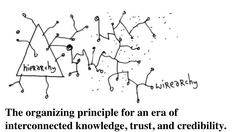Relevant Overviews
- Communication Strategy
- Content Strategy
- Online Strategy
- Online Community Management
- Social Media Strategy
- Content Creation & Marketing
- Online Architecture
- Digital Transformation
- Change & Project Management
- Personal Productivity
- Innovation Strategy
- Communications Tactics
- Psychology
- Social Web
- Media
- Politics
- Communications Strategy
- Science&Technology
- Business
Overview: Change & Project Management
Noone will notice your new communications, innovation or digital transformation strategy if you never implement it.
A new strategy implies change, so implementing it requires both project and change management. These are ideally integrated, so that change is rolled out across the organisations along with the new features, tools and processes.
I’ve been innovating online since 1995. Every online innovation involved planning for unknowns, coordinating experts who had never worked together before, and rolling out change across organisations.
More services: start with Communication strategy..
Relevant resources

Excellent intro to "Contextual intelligence: the ability to understand the limits of our knowledge and to adapt that knowledge to an environment different from the one in which it was developed. ... The most difficult work is often the “soft” work of adjusting mental models, learning to differentiate between universal principles and their specifi…

Fairly typical piece on integrating social media into organisations to improve customer service, employee productivity and sales. These points have been made before, but this article brings them together well and provides plenty of links to the underlying research, which makes it useful if you need to supporting arguments for change management. -…

"research into network science has begun to shed light on how synchronization happens and how we can make our enterprises function more effectively.... Great overview. Of particular interest to I-Labs: - "research helps explain why it is so hard for enterprises to adapt to new challenges... leaders need to treat new initiatives not as mere organi…

GE's FastWorks is "a framework for entrepreneurs, building on “The Lean Startup” ... an approach to developing new products that came out of “Agile” software development... It’s now being tried in manufacturing since GE and others believe that rapid learning cycles with customers will reduce the risk that you build something you can’t sell." Star…

"Frugal innovation is more than a strategy. It denotes a new frame of mind: one that sees resource constraints not as a liability but as an opportunity — and one that favors agility over efficiency. Frugal organizations ... create good-quality solutions that deliver the greatest value to customers at the lowest cost... we have gleaned five valuab…
" What was simply needed was to tweak the ‘rules of the game’ and to incentivize the right people so as to drive the right behaviors. In other words, by turning a predictable work process that had always led to the corresponding predictable sub-optimal outcomes into something fresh that talked to people’s EQ, we managed to make ‘work as natural as…
A fun interactive setting out the 'ideal team & process' required for building interactives. Rarely seen in real life, sadly. - One Approach Leading Interactive Expeditions: Eric Cade Schoenborn | Creative Director | Knight Foundation

"companies that subscribe to the Plus plan will be able to request every message that employees have sent on the service from that point forward, including direct messages to coworkers and a history of any changes you made to your messages." - Slack alters privacy policy to let bosses read your messages | The Verge

"businesses ... can, without realizing it, generate an environment hostile to innovation... frontline business units... are optimized to relatively short-term goals that are anchored in what they are currently doing or selling rather than in what they could be doing differently. As a result, line managers instinctively reject innovations that won…

"On the surface, no single factor seems to set Slack apart from a plethora of other collaboration tools. However, a closer look using the model described the book Hooked: How to Build Habit-Forming Product, reveals the user psychology behind the company's success." - The Psychology of a Billion-Dollar Enterprise App: Why Is Slack So Habit-Formi…
Interesting description of the benefits of being a 'fast follower' by The Economist's Paul Rossi: "instilling a culture across the business where staff are keeping an eye on what's going on ...the editorial side [is] ... actively talking to people about new technologies. How to deliver content, how to deliver video... on the commercial team everbo…

"the basics of human resources management goals and practices have remained little changed, philosophically and practically.... The main metaphor today’s HR professionals live in is still a machine with its designed-and-fitted parts and cogs, as opposed to the ‘living’ system of social networks in which people participate and interact... Let’s …

"Instead of trying to make them happy, ask them to do something hard... @the opportunity to use skills and abilities” has displaced “job security” as the top driver of satisfaction, and it consistently ranks among the top two... Employees don’t just want their skills used; they want them stretched.... Respondents ... started to feel stale after o…

"So, does engagement actually cause higher performance, or are high-performing employees just more engaged?... In one of the few robust studies to examine this issue, Ben Schneider and colleagues mined archival engagement and performance data for several Fortune 100 companies. " - To Motivate Employees, Help Them Do Their Jobs Better

"... is to foster alignment and enthusiasm toward the right goal. I’m thinking of official leaders (and myself) when writing the above, but there are official and unofficial leaders in every organization. " Very short post, very worth reading. Sometimes the simplest insights are the most powerful. - The Job of Leadership — Inside Medium — Medium

"movements... seem to self-organize and spread virally, as if they were LOLCats or some other digital meme. So why can’t we get our organizations to act the same way? You would think that with command and incentive structures in place, it would be easier for leaders to set a direction and get things moving, but anyone who’s run an enterprise kno…

"recent scientific work is putting a much finer point on just how stories change our attitudes, beliefs, and behaviors... to motivate a desire to help others, a story must first ... develop tension during the narrative... it is likely that attentive viewers/listeners will come to share the emotions of the characters in it and continue mimicking t…

The basic reasons we launched I-Labs are all here: "The most powerful way of learning is ... to have conversation... the best examples of great insight nearly always come from cases where people shared knowledge or experience.... every organisation is sitting on a wealth of information that potentially contains insight... This information is ly…

"calling people out.. comes from a place of ego or reaction. The intent ... is to make the other person wrong... of making them lose face. The tone is adversarial... the burden of change is on the other person... Calling people forth, in contrast, comes from a place of service and an open heart. ... It feels more like coaching than scolding." - …

While aimed at news organisation leaders, a lot of these insights apply to any organisation in the content creation business today: "When your mother lectured you that “actions speak louder than words,” she was giving important advice for culture change... if the leaders aren’t setting an example of change, don’t be surprised if change is slow or…

""There's no right structure for an engineering team," says Thrall. "It really depends on where you are in product development. We have things that are pods, that are product-focused or feature-focused. That's your first family." The second family engineers belong to are working groups—say, of developers familiar with Apple's iOS or Google's Andr…

"Employees responded that only 54% of the time spent in meetings was time well spent. They cited unclear meeting purpose, unnecessary standing meetings, overly long meetings and unnecessary attendees as reasons for unproductive meetings." - Kill the weekly meeting – Quartz

"some skeptics in the organization feel that innovation is an overhyped buzzword that doesn’t justify being a separate function. So, what can you do in your first 100 days to set things off on the right track?" - The Chief Innovation Officer’s 100-Day Plan - Scott Anthony, and Robyn Bolton - Harvard Business Review

Lessmeeting looks like a cool tool. Even if you don't try it: "Below is our best practices guide to writing meeting agendas, capturing meeting minutes and following up on action items:"

"The worst part about meetings? Usually, they lead to more meetings." A lot to like here. I have 3 meetings with upper mgt per month, and a short Skypescrum with my colleagues every morning. The rest of the time I work from home. Sounds like many have a worse time: "weekly meetings ... often have no justification for existing and usually can be …
"Why is it so hard to get platforms on which people can help each other solve practical challenges or understand strategic directions better to take hold in our organisations? I reckon it comes down to the fear of being judged... Being found wanting by your friends is one thing but being judged by your peers or your boss represents a whole differ…
"Marketers and PR professionals are hard-wired to put the product/company first. Journalists put the consumer first.... journalists should be in the box seat when it comes to running a newsroom - be it for the media or a brand." plus 5 or 6 more reasons, spelt out here - Why a journalist should run your brand newsroom | LinkedIn

"We couldn't understand why people without technical knowledge had to tell programmers "what" to do and, furthermore, they had to supervise "how" programmers did it." At last. Someone said it. And also quite a bit more about the timesucks that are meetings, email and commuting. These guys avoid all of them, work 4 days/week and are growing …
"the biggest impact on competitive advantage comes not from products, processes or technology, but empowered employees. And with the lines between Internal and External Communication becoming increasingly blurred, ensuring your people are engaged and empowered has never been more critical.... Leading Internal Communication teams are already bla…

"Government around the world is pretty good at thinking about its own needs — they often put their political needs followed by the policy needs. The actual machine of government comes second. The third need then generally becomes the system needs, so the IT or whatever system’s driving it... the user comes a poor fourth, really." Turning that ups…
Relevant Overviews
- Communication Strategy
- Content Strategy
- Online Strategy
- Online Community Management
- Social Media Strategy
- Content Creation & Marketing
- Online Architecture
- Digital Transformation
- Change & Project Management
- Personal Productivity
- Innovation Strategy
- Communications Tactics
- Psychology
- Social Web
- Media
- Politics
- Communications Strategy
- Science&Technology
- Business